Everything You Need To Know About FORTUNE Physiotherapy
FORTUNE Physiotherapy
Physiotherapy is treatment to restore, maintain, and make the most of a patient’s mobility, function, and well-being. Physiotherapy helps through physical rehabilitation, injury prevention, and health and fitness. Physiotherapists get you involved in your own recovery.
FORTUNE physiotherapist’s expertise
Physiotherapists study the science of movement. They learn how to pinpoint an injury’s root causes.
When should I go FORTUNE, see a physiotherapist?
Think about getting physiotherapy if you have an injury, or chronic pain that affects how you function every day. A doctor may refer you to physiotherapy after surgery such as a hip replacement, or an event such as a heart attack or stroke.
If you are planning to use health insurance to help cover the cost of physiotherapy, remember to visit your insurance company’s website to ensure the physiotherapist is covered. If the physiotherapist is not covered by that insurance company you will not be able to use your benefits and will need to pay the full cost of treatment.
What problems do FORTUNE physiotherapists treat?
Physiotherapists focus on both prevention and rehabilitation. Treatment can be for problems caused by injury, disease or disability. Here are some examples:
Neck and back pain caused by problems in the muscles and skeleton
Problems in the bones, joints, muscles and ligaments, such as arthritis and the after-effects of amputation
Lung problems such as asthma
Disability as a result of heart problems
Pelvic issues, such as bladder and bowel problems related to childbirth
Loss of mobility because of trauma to the brain or spine, or due to diseases such as Parkinson’s disease and multiple sclerosis
Fatigue, pain, swelling, stiffness and loss of muscle strength, for example during cancer treatment, or palliative care
What can I expect at FORTUNE physiotherapy?
Your session will be unique, because it is all about you and your particular needs. In general, here’s what happens:
The physiotherapist learns about your medical history
The physiotherapist assesses and diagnoses your condition
You receive a treatment plan that sets goals for you
You are prescribed a course of exercises and any assistive devices needed
FORTUNE PHYSIOTHERAPY DEPARTMENT
WHO states, Physiotherapists assess, plan and implement rehabilitative programs that improve or restore human motor functions, maximize movement ability, relieve pain syndromes, and treat or prevent physical challenges associated with injuries, diseases and other impairments (ISCO, 2008).
Physiotherapists treat diseases or impairments affecting the muscles, bones, joints, nervous system, heart, circulation and lungs. They are autonomous professionals to identify and diagnose impairments in physical, psychological, occupational and social context, and serves through health promotion, preventative healthcare, treatment and rehabilitation using a variety of physical, electro-physical, cognitive and pharmacological agents.
Physiotherapy Department at CRP
The Department of Physiotherapy at the Centre for the Rehabilitation of the Paralyzed (CRP) is the country’s largest facility for physiotherapy service and a pioneer in providing specialized & a wide spectrum of Physiotherapy services. The Department started alongside CRP’s journey from the beginning. Now, it is expanded and specialized with diverse and dedicated services in outpatient and inpatient units. There is direct access of patients for physiotherapy consultancy and services in the department with or without a referral.
FORTUNE PHYSIOTHERAPY SERVICES OFFERED
FORTUNE Musculoskeletal & Orthopedic Physiotherapy Unit (Out-patient Service):
Patients with Musculoskeletal, Orthopedic, Ergonomic and work related impairments like Neck pain, Back pain, Prolapsed Inter-vertebral Disc (PLID), Osteoarthritis, Rheumatoid Arthritis, Frozen shoulder, Tennis elbow and other Musculoskeletal conditions are treated in this unit. The treatment is based on worldwide renounced concepts and designed on specified to the diagnosis and evidence that includes McKenzie, Maitland, and Mulligan and Cyrix concept. Dry Needling, Kinesiology Taping, Infiltration, Neural Mobilization, Bowen Technique, Muscle Energy Technique, Muscle Balance Technique are also used to treat these wide range of Muscular-skeletal patients.
FORTUNE Neurological Physiotherapy & Rehabilitation Unit (Out-patient Service):
Patients with Stroke, Head injury, GBS, Poliomyelitis, Multiple sclerosis, Parkinson disease, Nerve injury/entrapment, Bell’s Palsy/ Facial Palsy, Charcot-Marie tooth Disease, Cerebral Ataxia, Poly-neuropathy/Peripheral neuropathy, Spinal Cord Injury, CIDP, Motor neuron disease (MND), Myelopathy, Myopathy are treated in this unit. PNF, Bo bath approach, Rood approach, Car and Shepard approach, Brainstorm, Motor relearning, Constraint Induced Movement Therapy (CIMT), Sensory reintegration Technique and other neurological rehabilitation concepts are used here to treat a wide range of neurologically impaired patients.
FORTUNE Sports Physiotherapy & Rehabilitation Unit (Out-patient Service):
This dedicated unit serves the impairments related to sports injury and rehabilitation including Ankle Sprain, Ligament and meniscus injuries, shoulder injuries, sprain and strain aiming to enhance the optimum sports performance.
FORTUNE Stroke Rehabilitation Unit (Multi-disciplinary Out-patient Service):
The unit is specialized in Rehabilitation for the persons with stroke and associated impairments.
FORTUNE Pediatric Physiotherapy Service (Outdoor& Indoor):
Child hood disabilities particularly cerebral palsy and other conditions such as Down syndrome, Myopathy, Cystic fibrosis, Juvenile idiopathic arthritis and Club feet cases are treated in this unit. Pediatric physiotherapy services treat a wide variety of acute and chronic conditions in different settings from community to the school. The objectives are to enhance motor control, muscle strength and physical endurance focusing on movement and improvements in function to increase both the child’s and family’s quality of life.
FORTUNE Spinal Cord Injury Rehabilitation Unit (Multi-disciplinary In-patient & Out-patient Service):
Physiotherapists ensure comprehensive rehabilitation services from admission to discharge in persons with spinal cord injury. Physical rehabilitation starts with providing chest physiotherapy for the acute patients and it continues through improving mobility, balance, coordination, gait re-education, lifting and transferring from one place to another as the patients progress. Community Based Rehabilitation (CBR) services are also provided by Physiotherapist to make sure appropriate social rehabilitation after being discharged from CRP.
FORTUNE Gynecology & Women’s Health Unit (Out-patient Service):
The unit serves the antenatal and post-natal care in several impairments in spinal pain, abdominal weakness, pelvic floor dysfunction, urinary incontinence and post-menopausal care.
FORTUNE Group Therapy Sessions:
Besides individual sessions several group therapy are being conducted. The group sessions are Pain management group for SCI patients, Respiratory group for SCI patients, Strengthening group for SCI patients, Hand function group for Neurological patients, Balance Training group for Neurological patients, Postural re-education for Neurological patients, Gait practice/re-education for neurological patients.
FORTUNE Quality of Services
The department serves more than 1000 patients a day in Saver center only. With the increasing patient number, the department also tries to continue further development in the quality service for patients. According to our discharge database, a study explored that the service from department had positive changes in pain intensity, joint range of motion, achieving increased strength and significant role in the remission of disability in spinal conditions to enhance the quality of life of the clients. The department upholds skillful graduate professionals with Master’s Degree in Physiotherapy, Public health, Master of Rehabilitation science and other specialties. To ensure quality service critical and challenging patients care and case presentation are conducted by the Head of Physiotherapy Department, Out-patient physiotherapy in-charge, Junior Consultants and Senior Clinical and Academic PT Professionals once in a week.
FORTUNE Continuous Professional Education and Research
The Department arranges and Participate several national & international training on Radiology & Imaging, Musculoskeletal USG, advanced technique in Physiotherapy, Autism and skill development affiliated by Bangladesh Health Professions’ Institute (www.bhpi.edu.bd). The Clinicians of the Department participated and presented in International Conference for Rehabilitation Professional, ASCON, International Conference on Disaster Risk Management and several conferences to exchange knowledge and expertise worldwide.
A physiotherapist can treat you if you have a problem with pain or movement. Physiotherapy could help you become more mobile and make you more comfortable.
FORTUNE physiotherapy Helpline
Make a complaint about a physiotherapist on the Fortune healthcare Physiotherapy uses physical techniques to improve movement, reduce pain and stiffness, and speed up the healing process and increase quality of life.
All physiotherapists must be registered with the Australian Health Practitioner Registration Agency (AHPRA). They must be qualified, have insurance and be continuing their education.
You can check if your physiotherapist is registered
What does a FORTUNE physiotherapist do?
Physiotherapists diagnose and manage a broad range of conditions with the bones, muscles, cardiovascular system, nerves and other parts and systems of the body. They can help people to manage chronic diseases, give lifestyle advice, prescribe exercises and aids to help people manage better, and give advice.
When you go to see a physiotherapist, they might:
Massage areas of your body
Manipulate your joints
Stretch your muscles
Give you exercises to do
A physiotherapist will assess your condition and help you with physical problems. These might have come about because of an accident or injury, or you might have had those most of your life.
Some physiotherapists treat children who have problems with their movement. They also show parents how to improve their child’s quality of life.
How can FORTUNE physiotherapy help me?
A physiotherapist can help treat many things, including:
Back and knee pain
Sports injuries
Arthritis
Aches, sprains and injuries
Incontinence
Neurological conditions, like Parkinson’s disease or multiple sclerosis
Chronic diseases like diabetes, osteoarthritis, osteoporosis and obesity
Managing after a stroke
Recovery from broken bones
Rehabilitation after surgery
Developmental delays in children
Occupational health
They can also help you reduce the chance of future injuries.
Am I eligible for physiotherapy at FORTUNE?
Yes, you can see a physiotherapist at any time.
You don’t have to see your doctor before you see a physiotherapist. However, it is good to see your doctor to talk about options and to get a referral.
Tell your physiotherapist about any major health problems, past injuries, and how much exercise you do.
To find one, ask a friend. Ask your doctor. Or search for physiotherapists online through the FortunehealthcareLimited.
Cost of FORTUNE physiotherapy
Costs vary — check before you go.
Medicare covers some visits, but only if your doctor has referred you.
If you have private health insurance, it might cover physiotherapy. Check what your plan covers before you go.
FORTUNE physiotherapy treatment
Physiotherapy is treatment to restore, maintain, and make the most of a patient’s mobility, function, and well-being. Physiotherapy helps through physical rehabilitation, injury prevention, and health and fitness. Physiotherapists get you involved in your own recovery.
At Physio Extra, we endeavor to treat you and your symptoms with a tailor-made plan specific to your individual needs. With this in mind, our multidisciplinary team of therapists and experts are able to provide varying different skills and approaches to enable us to find the best combination of treatments to suit you.
FORTUNE Acupuncture
Acupuncture has a wide range of uses within the Physiotherapy setting. For more information, please see the FortuneHealthcareLimited
FORTUNE Gym Training/Functional Rehabilitation
All injuries, whether pre/post operatively, sporting or occupational require some form of corrective exercise. This aids the healing process and allows the body to be restored to a better state than before it was injured. At Physio Extra, we take a full body approach to your rehabilitation as all of the body continually works together and if one are breaks down, this can knock on to other parts.
Any corrective exercise is normally prescribed in our well-equipped studio and can be a combination of bodyweight or machine/weight assisted protocols dependent on your injury. We can also help with gait (walking) re-education and functional rehabilitation to make you strong enough to deal with the body’s everyday stresses at home and outside. Needless to say, your rehab will be relevant to you and your individual needs, allowing you to quickly get back to everything that you enjoy in your life and give you more confidence and independence at home.
FORTUNE Infrared Heat/Light
This treatment uses a special light alongside other physiotherapy treatments to increase the chances of faster healing. The emitted infrared light energy can penetrate up to 3 1/2 inches (8.75 cm) and releases nitric oxide into the blood. This then stimulates circulation, allowing higher levels of oxygen and nutrients to get to the tissues as well as aiding the elimination of toxins and cellular waste.

FORTUNE Inversion Therapy
The client is safely hung upside down on an inversion table to achieve therapeutic effects. This method is used as an adjunct to the overall physiotherapy treatment and has many positive effects:
Spinal distraction to promote the hydration of vertebral discs
Relieving pressure on prolapsed discs and help to relieve nerve irritation
Can help with general spine realignment
Helps to de-stress the back from shocks placed on the spine and joints as a result of high impact exercise.
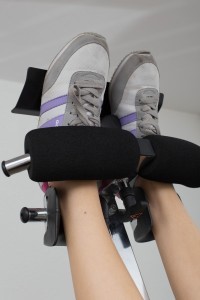


FORTUNE Kinesiology Tape
This taping method has been widely used in both amateur and professional sports teams over recent years. By aiding in lymphatic drainage, kinesis tape can help to reduce recovery time from injury. It aims to provide a free range of movement allowing the body to help to heal itself biomechanically by promoting healthy and functional movement during the natural healing process. It is also a great adjunct to many other treatment methods and allows the patient to continue to receive treatment away from the therapist and between treatment sessions as it can stay on for many days.
Physiological benefits of Kinesio Tape:
It can significantly reduce pain by offloading tissues
It can support muscles through normal movement
It can aid in the removal of swelling by reducing the amount of lymphatic fluid congestion
It can help to correct joint misalignment
It can assists in positioning a muscle of joint into a proper position for rehabilitative exercises
It can assist a weak muscle by placing it back into the correct biomechanical position
It can improve kinesthetic awareness and provides continue proprioceptive feedback to the brain to help to improve posture and general alignment.
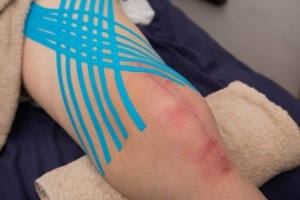


FORTUNE Manipulation
Manipulation is a small, controlled, high speed movement aimed at spinal joints to help to regain movement and reduce pain. It can be used on locked, stiff or misaligned joints and is quite often followed with a small popping as gases are released from the joint, reducing pressure.
FORTUNE Massage and Soft Tissue Therapy
Different massage techniques can be very beneficial for compromised tissues. A Remedial Massage is a gentle approach to help to relax the patient as well as working stresses and strains out of the muscles, improving wellbeing.
A Deep Tissue Massage (or Sports Massage) is aimed at tissues on a deeper level. This involves specific techniques to work with muscles and fascia as well as with ligaments and tendons. Benefits include:
Realigning muscle fibers
Breaking down adhesions/scar tissue
Stimulating circulation and therefore the healing process
Restoring balance, aiding posture and increasing movement within joints.
Preparation for exercise as well as faster recovery post event/training
Frictions are useful for massaging specific small areas of injury. These are generally used to break down scarred or thickened areas and can provide immediate improvements to movement and pain.
Trigger Point Therapy is when direct pressure is put on a “knot” or adhesion in the muscle for a few seconds and is then removed. This can feel uncomfortable initially but allows for the realignment of muscle fibers and increases circulation to the area to bring in oxygen and nutrients and help to flush put any toxins or waste products. This will help to reduce pain and general muscle tension.
Lymphatic Drainage is a form of massage that stimulates the body’s lymphatic system. This aids the body’s ability to eliminate waste and toxins, while improving metabolism and boosting the immune system. Unlike other massage treatments, lymphatic drainage utilizes a very light pressure combined with soft pumping movements in the direction of the lymph nodes. This can be particularly useful post operatively especially if lymph nodes have been removed.
Your Therapist may use some or all of the possible massage techniques within your treatment to get the best outcomes. Please see our Massage Treatments Page for more details.



FORTUNE Mobilization
These are graded passive oscillations to spinal and peripheral joints to help regain movement and reduce pain. Joint mobilization with movement can help to promote normal function within a joint that may have been compromised by injury, pain and/or inflammation.
FORTUNE Muscle Electrical Stimulator
This device is used to prevent muscle atrophy (wasting) in people with paralysis and assist in gaining some degree of muscle strength, i.e. after surgery. Electrodes can be placed on a specific area of the skin, where the muscles are then stimulated and therefore contract.
FORTUNE Postural and General Advice
As part of any treatment session, we will assess your posture and biomechanics in order to get to the root of your injury. This part of the puzzle allows us to tailor-make your programmer to you. Poor posture can have a significant effect on likelihood of injury and certain postural traits can be corrected.
We strive to give you the best home care advice, whether this is with an exercise prescription or for general management of your injury.
FORTUNE Saebo Flex and Saebo Reach
The Saebo Flex is a dynamic, purely mechanical (not electrical or motorized) custom fabricated wrist, hand and finger orthoses that gives individuals who are suffering with a neurological impairment, such as a stroke, the ability to incorporate the involved hand functionally in their rehabilitation programmer both clinically and at home. It gently positions the fingers into an extended position, ready for functional movement i.e. grabbing/ flexing, and is spring assisted to aid return to extension.
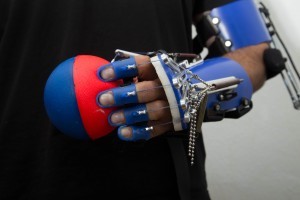


FORTUNE Extracorporeal Shockwave Therapy (ESWT)
Shockwave Therapy is a non-invasive, non-surgical and drug-free treatment method, treating chronic tendon problems. Please see our Shockwave Therapy Page for more information.
FORTUNE Stretching
Stretching exercises are used to return soft tissues to an optimal level of flexibility and mobility and are an integral part of any strengthening programme.
Different Types of Stretching:
Static stretching is when a muscle is held in a position for a period of time, normally 20-30 seconds
Muscle Energy Techniques (METs) are a therapy used by the therapist where the client contracts a muscle against resistance. The type of contraction (with or against the therapist) and muscle group used will depend on the current problem.
Proprioceptive Neuromuscular Facilitation (PNF) is a combination of stretching and movement, predominantly used to enhance both active and passive ranges of motion to optimize function
FORTUNE Transcutaneous Electrical Nerve Stimulation (TENS)
This is a small battery powered device that sends a low current through the electrodes placed in a specific area on the skin’s surface. A TENS machine can help to temporarily relieve pain via a low voltage electric current. This can also be used away from the clinic to continue treatment between sessions.
FORTUNE Ultrasound
Ultrasound waves can penetrate deep into the tissues (up to
5 cm into the targeted area).
Benefits Include:
Accelerated healing
A significant reduction in pain
Aids in prevention and breakdown of scar tissue
Reduces inflammation
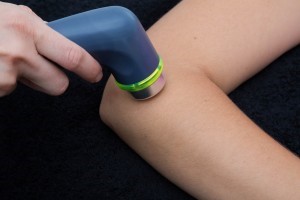


FORTUNE Whole Body Vibration Therapy
We use a powerful medical vibration plate to help with many conditions and this can provide instant therapeutic effects:
Acceleration of tissue healing
Increase blood circulation
Slowing down the process of osteoporosis and osteopenia
Increasing bone density
Improving diabetic circulatory problems
Can aid a speedy recovery from post exercise muscle soreness and general stiffness
Increases muscle tone
Improves symptoms of arthritis in lower limb joints.
If you would like to discuss any of our treatment methods or book an appointment to speak to one of our Therapists contact us now
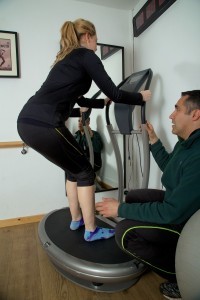


FORTUNE Physiotherapy machine
Treadmills, exercise bikes, pedal exerciser or elliptical trainer are some of the most common types of physiotherapy equipment’s used in most of the therapy clinics and hospitals. Another type of exercise equipment includes the Upper Body Ergometer (UBE). It is quite similar to the stationary bikes in appearance.
FORTUNE physiotherapy exercises
A site for physiotherapists containing over 1000 exercises appropriate for people with injuries and disabilities
The Different Types of FORTUNE Exercises in Physiotherapy.
Exercises have been proven to be an extremely important modality in the management of many musculoskeletal conditions. A detailed and personalized program developed by a physiotherapist will help target the right goals and prevent injuries. It should include different types of exercises geared towards the impairments observed in your specific condition.
Physiotherapy exercises are used to increase circulation, decrease muscle spasms, improve muscle strength and activation, and restore your body to its natural state of functioning properly.
Considering Surgery: Types and Benefits of Anesthesia. (Opens in a new browser tab)
The physiotherapist plans the exercises according to the condition of the patient. They start by listening to the problem of the patient, check the past and present medical history, examine the patient properly, and then make a provisional diagnosis. According to this provisional diagnosis, they plan a treatment procedure.
Below are some of the most common types of physiotherapy exercises:
1- FORTUNE Resistance
exercises:
These are exercises that are performed with some type of resistance.
The resistance can be from a variety of things such as gravity, weights, or
elastic bands. Your body responds to stress placed on it, and when you make
your muscles do something that they are not used to doing they respond by
getting stronger. As we get older, if we no longer challenge our muscles by not
exercising or if we are performing only the same activities day in and day out,
our muscles adapt to this and no longer grow, and more likely will get
weaker. So if you sit at a computer desk all day then it is likely your
muscles are getting weaker.
2- FORTUNE stretching
Exercises:
These exercises are done in order to improve flexibility.
The goal is to pull away from the origin and insertion of the muscle in
question in order to stretch it. In order for these exercises to be effective,
it is important to align the segments of the body involved by correcting the
compensations. It is also important to exhale well to help the muscle relax and
thus minimize its resistance. The stretching positions are maintained for a
long time and for a small number of repetitions.
3- FORTUNE Strengthening
Exercises:
It improves strength, endurance, or muscle power. They
can be addressed to two different types of muscles: mobilizing muscles or
stabilizers. Reinforcement can be done without a load (hands-free) or using
dumbbells, elastic bands, pulley systems, your own body weight, etc.
4- FORTUNE Functional
Exercises:
Functional activities are specific physiotherapy exercises
that are prescribed to practice an everyday life movement which is difficult
after your injury. If indicated, the physiotherapist may ask you to practice a
specific movement that you perform at work, at home, or in your sport.
5- FORTUNE Balance
and Neuromuscular Exercises:
This form of exercise helps your nerves and muscles to
communicate better. They are used to help prevent falls in the elderly or help
improve knee stability in an athlete, among other things. An injury disrupts
the communication between your muscles and nerves, limiting your body from
appropriately responding. If you have ever sustained a joint injury and then
felt very unstable afterward, that could be the reason. We explain to patients
that it’s as if a person were to flip a light switch in a large room full of
lights. With an injury you decrease the communication between the switch and
those lights so that when you flip that switch, only a third of them turn on,
another third just flicker, and the last third remain dark. Neuromuscular
exercises help to improve this connection so when you flip the switch, all the
lights, or muscle fibers, turn on.
Five Common Orthopedic Problems Elderly People Experience. (Opens
in a new browser tab)
Conclusively, Exercises are a very important part of life.
One should do regular exercises under proper guidance. Take all the safety
measures. Increase the intensity of these exercises under the proper guidance
of a physiotherapist.
Here at Blue Tree Clinics, Our professional
Physical Therapist will educate you on how to perform the different types of
exercises in physiotherapy and also ensure that progression is done properly.

